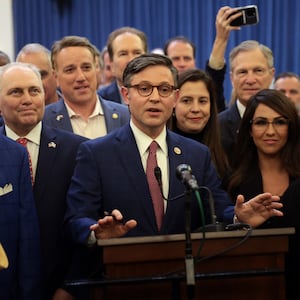Government funding runs out next week, House Republicans keep tanking their own appropriations bills, and the Speaker of the House is weighing whether he can get away with a stopgap spending solution.
If this story sounds familiar, it’s because it’s the exact situation in which Speaker Kevin McCarthy (R-CA) found himself in September—only now, it’s November and it’s Speaker Mike Johnson’s problem.
Republicans are hoping Johnson will somehow deliver a solution to all of their legislative woes. But without a recognition that the House GOP isn’t going to magically come to an agreement about a host of issues—like overall spending levels, individual policies in appropriations bills, or the fact that the Democratic Senate and the Democratic president aren’t just going to swallow Republican bills—a solution doesn’t appear in the offing.
“It’s the same. It’s the same set of issues. Again, the same tectonic plates,” said Rep. John Duarte (R-CA). “New speaker, nothing’s changed.”
Eight conservative rebels deposed McCarthy after he dared to keep the government funded with a 47-day spending bill, known as a continuing resolution. A month later, Johnson faces similar political and legislative realities that ended McCarthy’s reign.
The clock is ticking for the new speaker to come up with a solution as government funding is set to expire Nov. 17. and Johnson still hasn’t presented his plan.
At the beginning of his speakership, Johnson roadmapped an effort to advance the remaining individual spending bills to a floor vote. That initial process appeared to be going well for Johnson with the House passing three appropriations bills—energy and water development, interior and environment, and a legislative branch bill.
But this week, that momentum screeched to a halt as Republicans reignited their internal bickering. Johnson was forced to yank two spending bills after Republicans failed to get on the same page. (GOP leaders pulled a transportation and housing spending bill on Tuesday over Amtrak cuts, and on Thursday, Republicans withdrew their financial services and government spending bill over contentious abortion and FBI-related provisions.)
“We are in a difficult position right now. I thought we were going to show the speaker a little bit of grace. He was placed in a very difficult position. He was given a soup sandwich,” said House Freedom Caucus member Troy Nehls (R-TX).
“It is looking like we’re still confused, and we are not united,” he continued.
With Johnson’s hopes to pass each spending bill individually in tatters, some kind of stopgap spending plan seems inevitable. But it’s unclear what that bill could look like. Rather than proposing legislation this week, Johnson polled his GOP conference for their ideas and got back a host of different ideas.
Among the options under consideration is a so-called “laddered” continuing resolution—a novel idea in which certain spending bills would expire sooner than others, though many Republicans are nervous that procedural gambit would just cause more shutdown scares.
But conservatives—like Rep. Chip Roy (R-TX)—are framing a continuing resolution as an unacceptable extension of budget and policies passed when Democrats controlled the chamber. Instead, Roy has called for spending cuts and using the spending negotiations as leverage for border reform.
Several House Republicans are also wary of a continuing resolution that only lasts a few weeks into December, which ups the likelihood that the Senate advances a huge spending package before the holidays, and then the House just accepts the legislation so lawmakers can go home.
Rep. Tim Burchett (R-TN), one of the eight members who voted to remove McCarthy, said he would like to see the “laddered” approach addressed. But as far as moving legislation forward, Burchett suggested leadership will have to first allay right-wing anxieties.
“They just need to address some concerns, some conservative concerns that we've had,” Burchett said. “And that would be a good signal to us. The fact that we are here, and were not going anywhere, and those issues need to be addressed.”
As Burchett said, the government is “$33 trillion in debt and we just keep doing it.”
But, in a positive omen for Johnson, Burchett said he doesn’t think the new speaker is falling into the same traps with conservatives that led to McCarthy’s ouster.
“Mike Johnson is an honest, honorable man and over half the country believes that we did the right thing,” he said.
Rep. Thomas Massie (R-KY), a conservative debt hawk, is advocating for a lengthy, one-year stopgap resolution that would fund the government until September. While a short-term measure appears to be gaining traction, Massie said a long-term extension would help protect Johnson from being eaten alive by his own conference.
“Everybody is facing that same state of play. That's why I’m in favor of a one-year CR that goes to September 30,” Massie said. “Every time something expires, the speaker is putting his head in the lion’s mouth, and I would advise not to do that any more than you need to.”
(Members of the Appropriations Committee, who write the spending bills, would be fiercely opposed to Massie’s solution—not to mention Democrats.)
Still, Republicans have pointed to a few reasons Johnson may fare better at handling a looming shutdown than McCarthy. For one, the House Republican conference is fed up with the rebels responsible for stripping McCarthy from the speakership.
“Any of the eight who ousted McCarthy are on thin ice,” as Massie said. “There may be another eight that get upset, but I think those eight have already used their power.”
Rep. Dan Meuser (R-PA), a member of the bipartisan Problem Solvers Caucus, also suggested that Johnson may be insulated from right-wing attacks over a continuing resolution if lawmakers instead scapegoat McCarthy. Meuser said that sentiment could help Johnson secure Republican votes for a continuing resolution.
“We’d have enough votes, because, as one member put it, ‘The backup quarterback that comes in, you can’t blame him for what occurred the first three quarters of the game, right?’” Meuser said.
Rep. Ryan Zinke (R-MT) acknowledged Johnson faces the same uphill climb as McCarthy on appropriations given “the only thing that has changed is the speaker.” But he said—from his perspective—Johnson is still in the conference’s good graces.
“The new speaker has new runway. So as long as the Republican caucus gets behind him. Then we’ll move forward,” Zinke said.
Zinke compared the situation to putting new wheels on an old wagon stuck in the mud—it will still take collective effort from House Republicans to unstick the wagon.
“And if everyone pushes together, we’ll get through. But if people decide to push different ways, then those wheels are gonna come off, and we’re gonna go right back into the mud.”
Even if Johnson is able to unite his fractured conference, he still has to contend with the Senate where Democrats have reportedly pushed for a short-term spending measure until early December. And if Johnson inserts hard-right priorities into a stopgap proposal to win over conservatives, Senate Majority Leader Chuck Schumer (D-NY) suggested it would be dead in the water.
Meanwhile, Democrats in the House are getting antsy without a plan from Johnson and are agitated that the House GOP’s dysfunction is just increasing the chances of a shutdown.
“These Republicans are not fit to govern,” Rep. Jim McGovern (D-MA) told the Daily Beast. “This is ridiculous, putting the country through this trauma every few weeks and you know, all the internal strife within the Republican conference. It’s just exhausting.”
Even with a new speaker, McGovern said, “It’s basically the same menu but a different waiter.”
House Democrats also aren’t looking to bail Republicans out if they can’t unite their conference around a plan. House Minority Leader Hakeem Jeffries (D-NY) said Democrats are opposed to the laddered approach.
A visibly frustrated Nehls railed against that party drama as he left the Capitol Thursday smoking a cigar. Despite Republicans having just tanked one of their own spending bills, he said he doesn’t think “anybody in the Republican Party truly wants to shut down the government.”
“I’m hoping we don’t get there,” Nehls said of a shutdown. “I hope we can do something and unite behind Mike Johnson, that has an impossible job. It’s impossible.”






